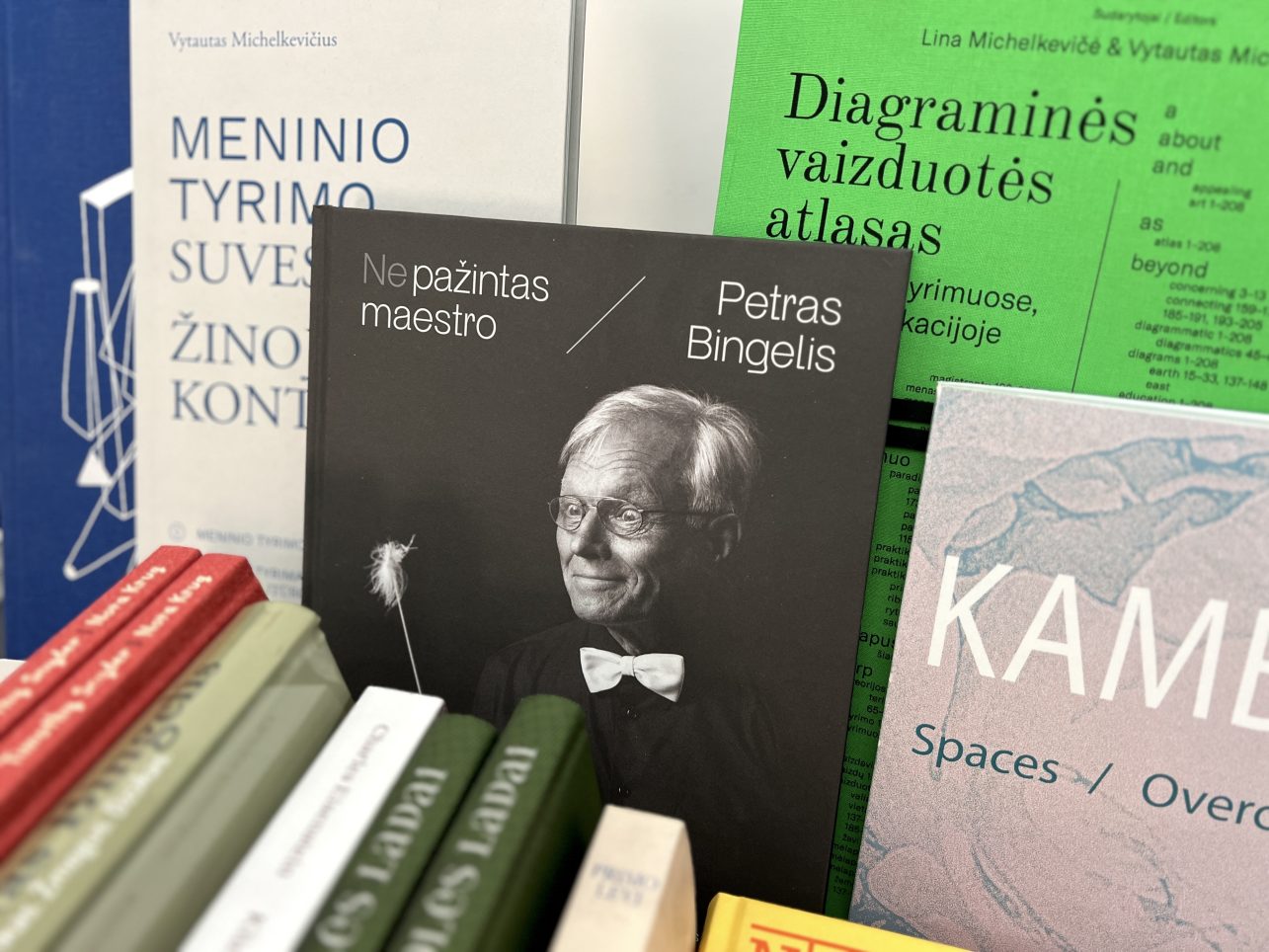“Imagine, a person who always provided you with good emotions, a person whose company you enjoyed and whom you admired, passes away,” Ilma Bingelienė says. I asked her if the goal she set with her husband Jurgis – to prepare a memoir about Petras Bingelis – made it easier to cope with her father-in-law’s death.
The couple, who have been living in Oslo for several years, say that after Petras Bingelis passed away on December 6, 2020, the nature of their trips to their homeland changed. Now, the first thing they do upon arrival is visit the maestro’s bust in the Kaunas State Musical Theatre Garden. You could to meet the couple on October 4 at the Kaunas State Philharmonic, where they presented the publication they have been working on for three years.
The Unfamiliar Maestro. Petras Bingelis (Nepažintas maestro. Petras Bingelis) is the title of the book. Its cover photo was taken by Algimantas Aleksandravičius. In the photo, the main character is playfully watching a feather that has landed on the baton. The book itself contains memories of fifty people – family members, colleagues, students – who, in one way or another, were part of the conductor’s life. From his sister to his granddaughter (and a couple of people after her), in the order in which the maestro knew them.

“After his death, several programs were broadcast on the radio, and people began writing and sharing their memories. We realized that we knew nothing of his professional life, only about his personal one. And then we had this spontaneous idea: how about writing a book?” Ilma recalls the idea they both instantly believed in. Jurgis adds that not everyone they spoke to about the idea believed in it, though they only revealed this after receiving a copy of the book. It was truly a big undertaking, considering the number of individuals involved, including some very important and busy people. Of course, this also includes the members of the Kaunas State Choir – founded by P. Bingelis – which celebrates its 55th anniversary this October.
Jurgis and Ilma say that they were often surprised to hear how strict “daddy” – as the conductor was called by both family and choir members – could be. At the same time, he was strong, spiritual, hospitable, straightforward, reserved, patient, dutiful, demanding, and a traditionalist. His interests were broad – not only was he concerned with music, but also with the city and the country. Among other activities, he worked in the local government for several years and was involved in the growth of the Pažaislis Festival. How well he managed all of this and which of his works people remembered as the most significant you can learn in the book. As you read the warm, but seemingly unembellished stories, you understand that he was a person open to the goodness of the world but closed off to its evil. “He was always very genuine, the kind of person with whom you could sit in silence and not feel burdened by it,” Ilma, who calls her father-in-law the centre of the Bingelis family, says.
I’m hesitant to ask, but I want to: did the family members have enough time with that centre, that Petras, who spent so much time on stage, behind the scenes, in his office (where he even managed to practice yoga), and on tour? “Home was his place of rest and peace,” Vida Bingelienė, who came to a fateful choir audition in 1979, is quoted in the book. She also admits that she missed her husband’s more frequent conversations with his children. According to Jurgis, who grew up with his brother Povilas, the fact that their father worked a lot always seemed natural to them. He, the youngest, was born when the choir was already 15 years old, and their father was an important part of the cultural life of a rising Lithuania.
Music has always been an important part of the family’s life, and it continues to be present in the Bingelis’ home in Norway. Guests are welcomed with jazz recordings and on special occasions, Ilma sits at the piano, and Jurgis reaches for the trumpet. When asked which choral music pieces are most dear to them, they mention “daddy’s calling card” „Lietuva brangi“ and „Už Raseinių, ant Dubysos“.
“We don’t stay in Kaunas as long now, but before, when Petras was alive, we would always attend a concert, go to the Philharmonic, and visit his office. And we would have lunch – it was a tradition – to go to Bernelių Užeiga,” they say, adding to each other’s points, when they talk about what being in Kaunas means to them, now as Lithuanians living in Norway. Nida was also important, where they all last gathered together in 2019, as well as a village in Dzūkija. When the children returned, the maestro would take a vacation and gladly spend time with his family. However, Jurgis recalls that Petras was very busy during the last summer of his life.
“I would contact everyone as Petras’ son. We would interview people together, and Ilma’s job was to transcribe the conversations, edit them, organize them chronologically, and also verify facts, as the dates written on the photographs didn’t always match,” Jurgis explains the three-year process of preparing the book. He is also a photographer, so he also worked hard, searching through the family archives to find suitable images to illustrate the various memories. One of P. Bingelis’ two sons complemented his personal memory with a photograph he took himself. In it, the maestro, with his back turned to the camera, walks deeper into the Mardasavas forest. It’s the last picture Jurgis took of his father in July 2020. “It’s as if he just left… and stayed in that pine forest where he grew up,” the conductor’s son says in the book.

Jurgis emphasizes that the book – with its unconventional format – has his father’s traits. For example, it seemed important to them to print the book in Lithuania, not in Poland, where it would have been cheaper. After all, their father was a patriot. The book’s design was done by a young creator, Aistė Tarutytė – supporting rising talent was also very important to P. Bingelis.
In order to cover the publishing costs, the couple found private sponsors and also wrote a project for the Lithuanian Council for Culture. A fund was established for that purpose which will also be useful in the future, for example, when making a film. There is no specific plan for it yet, but there are definitely ideas, as well as archival material.
Last autumn, musicologist Viktoras Gerulaitis released the book Petras Bingelis: Artist. Man. Dzūkas (Petras Bingelis: Menininkas. Žmogus. Dzūkas). The young couple says that the two publications, which appeared around the same time, do not compete in any way but rather complement each other. The musicologist compiled the professional’s life story, while the people brought together by Jurgis and Ilma talked about his personality traits. You can find both books at our editorial team’s favourite bookstore, Kolibris, on Donelaičio Street. The Bingelis publication is also available in many other bookstores and libraries across Lithuania. This distribution was expensive, but it was necessary to bring the book closer to the readers. It’s worth reading about this great yet humble man, even if you’ve never attended a Kaunas State Choir concert. But could that really be the case?
“I really liked when his mother once said, ‘He is very good.’ Of course, every mother thinks her child is the best, but he truly was good,” Vida Bingelienė says in the book. Her concise, almost modest thoughts reveal the subtle traits of her husband’s personality, so let this final thought become the concluding sentence of this text, “Sometimes he felt that we underestimated him.”




